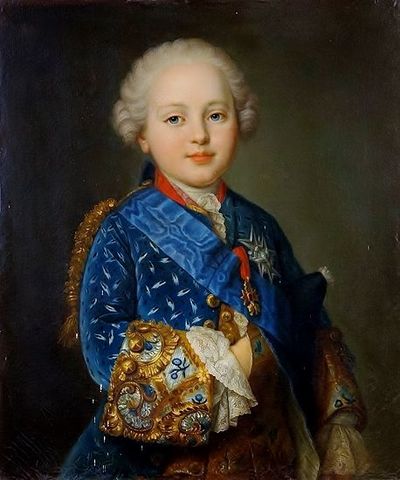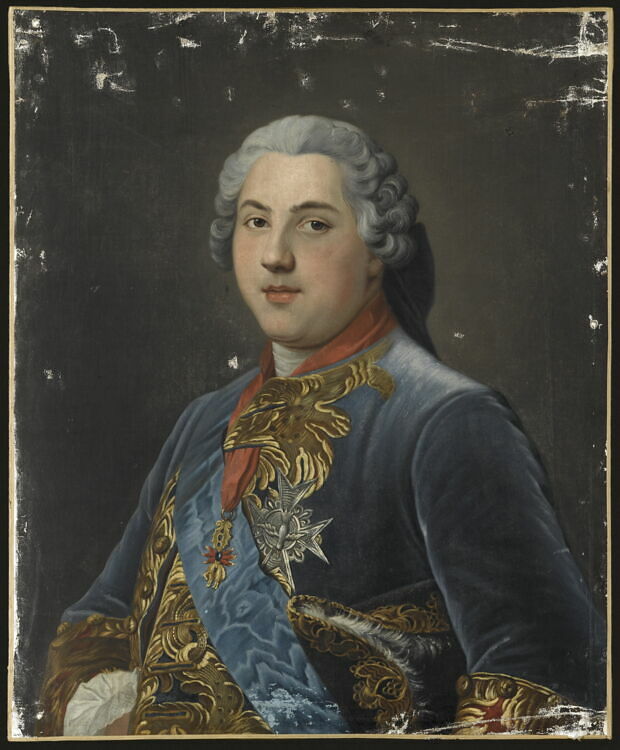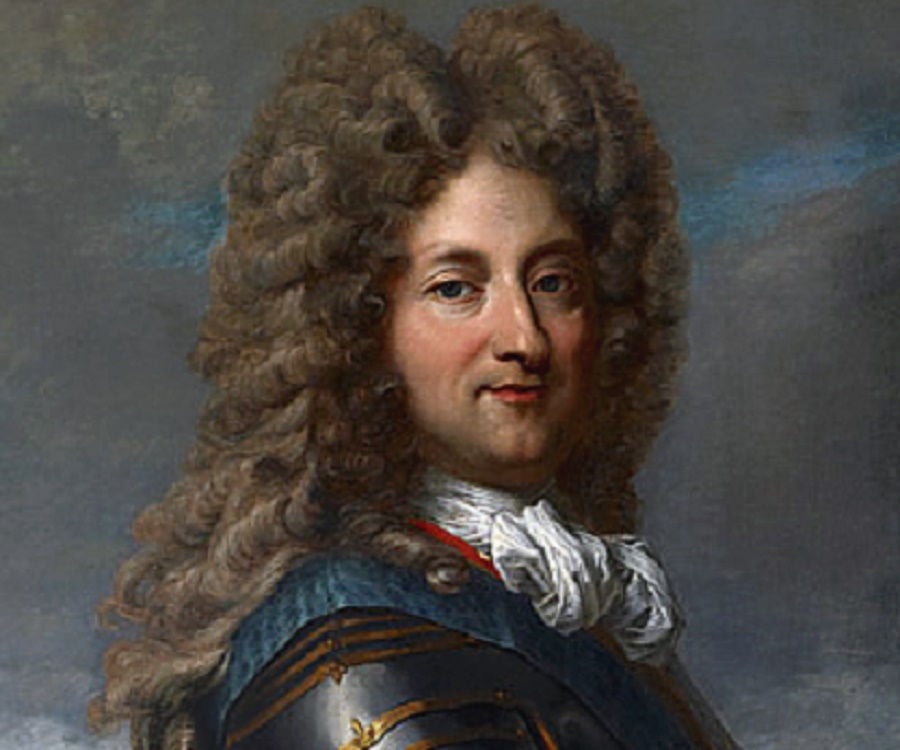In 1760, the young Louis Auguste held the title of Duc de Berry and was third in line to the throne of France - at this point in time, few expected that he would one day become Louis XVI, as both his father and his elder brother stood to inherit before him. At the age of 6, the Duc de La Vauguyon was appointed as the governor of the young prince - a choice that the pupil himself would later come to deeply resent.
As a royal prince, his education was widespread and largely dictated by his father, Louis Ferdinand: religious studies, latin, geography, history, chemistry, mathematics, physics and astronomy were amongst the fields covered. Later, he would add English to his list of languages. The young Louis appeared to have had a natural talent for especially geography - a subject he would devote many hours to as an adult. During his lessons, he would draw up detailed maps of Versailles and its surroundings. Likewise, he seems to have had a firm grasp on the otherwise labyrinthine system of finances which can be seen from his numerous attempts at financial reform in the late 1780's.
Rather unusually, both the Dauphin and Dauphine took an active part in their sons' education. Twice a week, Louis Auguste and his brothers would be taken to their mother's apartments where they would be heard in the lessons of the week. This must have been somewhat awe-inspiring for a naturally timid boy, especially considering that both his younger brothers were more self-confident.
 |
| Louis XVI while Duc de Berry |
La Vauguyon often tasked his pupil with writing smaller treatises on rather dry, but important subjects. The first of these had the lengthy title: "Moral and political maxims drawn from Télemarque concerning the science of kings and the happiness of peoples". Ironically, Télemarque had been the main character in a book published by Fénelon in 1699 which had subsequently been banned by Louis XIV for being too outspoken in its criticism of the absolute monarchy. Yet it was chosen by La Vauguyon for the Sun King's successor.
The Duc de Bourgogne, died unexpectedly in 1761 and his father followed him to the grave just four years later. This left the eleven-year old Louis Auguste as the new dauphin. From a purely educational viewpoint, the change had an immediate impact on his lessons. Added to the curriculum of courtly and scholarly virtues was now the awe-inspiring lessons in kingship.
On La Vauguyon's urging, Moreau and Berthier drew up no less than 35 "reflections" on the meaning of kingship. These were then drilled into the head of the king-to-be over a period of three years. It is a testament to Louis' memory skills that even La Vauguyon was impressed with how well he understood the reflections. These reflection gives a clear insight into the values distilled into the young man. Amongst them were the doctrine that a good king's sole purpose was to make his people happy and virtuous; likewise, he was to refrain from bloodshed - both at home and in war - unless absolutely unavoidable. This was not merely an education in how to subdue and discipline his people - it was a lesson in ruling with compassion and justice.
One particular aspect of Louis' education appears to have had a profound effect on him. By nature, Louis Auguste was shy and preferred to keep to himself. This characteristic can only have been furthered by the instruction from his confessor, Abbé Soldini, to "never let people read your mind". Likewise, he was taught that as king, it was vital that he did not become too open with his surroundings. Given such instructions it is hardly a wonder that the adult-Louis would have seen little reason to break off his natural reserve.
 |
| The Duc de La Vauguyon |
Religion had an intense influence on the dauphin's education. Both his parents belonged to the Dévot party and most of his tutors were chosen accordingly. Thus, his education would be heavily influenced by religious dogmas.
One thing that stands out from the manner in which Louis Auguste was educated is that he was rarely urged to reach his own decisions. The teaching methods employed by La Vauguyon focused primarily on learning to repeat back what had been taught; there does not seem to have been much - if any - room for actual reflection on the subjects. In those few cases in which the pupil was expected to think about the subject at hand, there would usually be a correct answer. Thus, it appears that emphasis instead was placed on drawing inspiration from or downright reciting others; this could very well have contributed to Louis' later infamous characteristic of indecisiveness. After all, if a pupil is never taught to independently process a situation or concept and reach their own conclusions in childhood, how can they they be expected to do so later on?
The most influential figure during this period in his life was the Duc de La Vauguyon. The education he passed on to his royal pupil famously centered on four virtues: piety, goodness, firmness and justice. Initially these seem to be sound principles to instill in a young prince. However, La Vauguyon himself did not quite live up to one of them in particular: goodness.
The Comtesse de Boigne would later say of Louis XVI that the king had claimed to only habour a feeling of hatred towards one man: La Vauguyon. Whether that was ever actually uttered by the king is impossible to know. What is more certain is that La Vauguyon believed in the old-fashioned type of teaching which included a good deal of discipline and strictness.
Interestingly, considering his avid passion for it, hunting was not included at all in his father's plan for Louis' education. It was not until his death that Louis XV gave his permission for his grandson to begin riding lessons. At this point he was 13 years old. The exercise proved to be an immense help to the dauphin. It strengthened him physically and allowed him a respite from the constraints and pressure placed upon him.
 |
| Louis Ferdinand - Louis XVI's father who heavily influenced his sons' education |
One thing appears to have been remarkably absent from his education considering his status: military strategies. Unlike most of the noblemen's sons whom he interacted with, he had never been to either the École Militaire or the Invalides. Combined with his utter lack of martial aspirations, it is little wonder that Louis XVI never became known as a military commander.
In a similar vein of thought, very little attention appears to have been devoted to the inner workings of the state apparatus. Considering that he was to exercise complete control over the French government, La Vauguyon does not seem to have introduced him to the finer workings of bureaucracy. Likewise, there appears to have been no focus on current challenges faced by France.$ When he ascended the throne in 1774, the harsh regimen of La Vauguyon had imbued the new king with a well-read mind, but had failed to provide him with the tools necessary to rule as an absolute monarch.
It was not until around 1770, that Louis XV became personally invested in his grandson's education. From then on, he would instruct him himself in various subjects. By this point, Louis Auguste appears to have become a young man with ideas of his own as to how France could be governed. The future king's analytical mind enjoyed the exercise of drawing up various reforms to improve his nation; when he ascended the throne, he would attempt to enact them but largely unsuccessfully. His ideas might have worked had they come a few decades earlier. But by the 1770's and 1780's, France was too divided between the firm adherents of the ancient regime and the followers of the newer Enlightenment. Wherever the new king turned, he seemed to be met with rock solid resistance and a fierce refusal from both sides to even attempt to cooperate. As a result, the king would be plagued by self-doubt and change his mind numerous times.
The times were changing when Louis Auguste received his education and it was very much reflected in it. On one hand, the pupil was taught about the absolute power he was to yield and the god-given right he had to do so. One the other, the Enlightenment was sneaking in with thoughts on liberty, equality and a humanity. It is hardly surprising, then, that Louis XVI would struggle his entire life with the keen balancing act of being an absolute monarch with the virtues of a child of the Enlightenment. Sadly, in the end, it proved to be two doctrines too far removed to be compatible.




